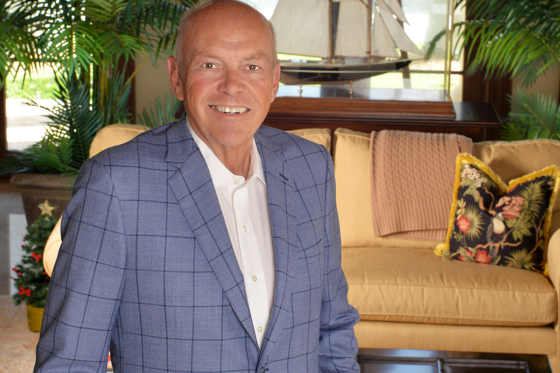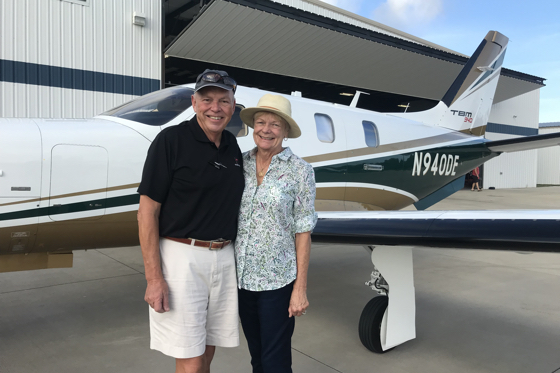Leland “Lee” Pillsbury thinks in a kind of mental surround sound. He can wrap his head around the micro and the macro simultaneously and process the potential of both from the viewpoints of a guest, owner, operator and investor.
That 360-degree radar has made this 73-year-old hospitality veteran one of the most prolific — and successful — disruptors in the business. It’s also enabled him to find opportunities in the worst of times, including the nightmare of COVID-19.
Contributed by Mary Scoviak
His response to the pandemic shows how that works. He is targeting technology with next-gen solutions for two significant ongoing challenges: labor costs and productivity. He is also launching a fund to invest in hotel real estate. Although the ceiling hasn’t been set and there is no stated timeline, it’s likely to be in the US$200 million range, Pillsbury said.

The man who loves to mentor also see the personal impact. “This is a human tragedy on a scale never experienced in our lifetimes,” said Pillsbury, who remains a cautious optimist and predicts the hotel sector will recover (not significantly until 2022).
“But it won’t be smooth,” he added. “Companies are saying 80% to 85% of business travel will come back. The other 10% to 15% may be gone permanently. I’m worried about all of us in service industries.”
First-mover advantage
The Marriott International general manager-turned-executive vice president shook up the status quo with rollouts such as the under-the-door express checkout, the first successful guest-frequency program, the first revenue management (then called yield management) system, and the creation of the Fairfield Inn brand.
Now, the investor who co-founded Thayer Lodging Group with his former Marriott boss Frederic Malek (and delivered average IRRs around 25% from its 1991 debut till its 2014 sale to Brookfield Asset Management), co-founded and launched more than 17 companies and now serves as a managing director for the venture capital firm, Thayer Ventures (TV), this economic climate is “the greatest opportunity in my career.”
Given the innate need for speed that fuels his interest in yachting and aeronautic achievements such as being part of the first husband-and-wife team (his wife, Mary, is also a licensed jet pilot) to fly a single-engine jet across the Atlantic, it’s no surprise he’s among the first out of the blocks.
In May, when most of the hotel industry was still on the mat after the pummeling of coronavirus, Pillsbury and his fellow TV managing directors raised US$80 million to complete the Thayer Ventures Fund III. Where everyone from big-brand CEOs to big-bank C-suiters saw near-term devastation and little hope of recovery for at least two years, TV’s leadership honed in on what they considered to be an unprecedented chance to invest in technology-driven startups that would accelerate and profit from the pace of change in the US$10 trillion global travel and transportation sector.
“There are disruptions across the value chain,” says the 2016 Cornell Entrepreneur of the Year, and each one presents an opportunity. “Tech: labor, revenue management — there’s so much creative work being done. People talk about the hotel industry as being a mature industry. Nothing could be farther from the truth. More innovation is going on in our industry than any others. I’m meeting with a lot of young entrepreneurs to see how we can make our business better — and cut costs.”
Focused on why, how
In fact, Pillsbury is on the hunt for entrepreneurs who can monetize broad shifts in consumer behaviors.
Data science should be a gold mine. In Pillsbury’s view, hotel companies will have to cure their brand-centered guest myopia and figure out how to leverage every buying decision their customers make into reasons to choose their hotels. His lifelong curiosity about the why and how factors point to business-building ways to use technology to do that efficiently and cost effectively.

“Marriott may know everything I do when I’m at Marriott, but they don’t know what I’m doing anywhere else,” Pillsbury said. “They know that I’m here, but they don’t know why I’m there.”
That’s why young enterprises such as Adara are in TV’s portfolio. This data, technology, and services provider combines thousands of points of data on each traveler to uncover intent, propensity and preferences to deliver merchandising optimization and personalization solutions. “Adara tracks a billion people. They know what car each person drives, what clothes they’ve bought, where and what they eat. With that data, they can tell us what people are thinking before they think it,” Pillsbury said.
Hoteliers also have to think about how to fully optimize that as 5G sets the stage for collecting “a lot more data.” It’s that information that will define not only the on-property experience but also decisions on where to develop or acquire hotels based on where their target customers are going and where they are not.
That depth of customer knowledge is going to be even more critical as Google phases out third-party cookies over the next two years (first-party cookies will still be allowed. “Finding a technology to enable hotel marketers to reach customers efficiently will be a whole new challenge,” Pillsbury said.
No panaceas
On the operations front, Pillsbury’s targeting technology with next-gen solutions for two of the industry’s most significant ongoing challenges: labor costs and productivity. At the top of the list are startups like Optii Solutions. The use of artificial intelligence, analytics, messaging and mobility can help streamline housekeeping and operations while increasing customer satisfaction with better/faster monitoring and tracking of guest requests and time-saving automation and management functions. Platforms like these could increase room attendant productivity by double digits, improve supervisor efficiency by 40% and reduce room rushes by 80%, according to Pillsbury.
He’s a believer in robotics — not the cute little pared-down R2D2s that deliver room service, but the sleek units that could revolutionize some back-of-house functions.
“Take dishwashing. It’s a dirty, unsafe job no one wants to do. It’s a nasty working environment,” said Pillsbury, who had first-hand experience washing flatware at the Conrad Hilton as a summer intern. “A robot can sort, scrape, clean and load dishwashers with less energy and water usage and a higher level of hygiene.”
He sees ventures such as Dishcraft, a robotics company that sorts, scrapes, and loads the dishwashing machine as a promising example of robotics applications in hotels.
Though he calls blockchain “the biggest disruptor” behind the scenes, Pillsbury can find room for improvement all along the value chain. Revenue management is ripe for some blue-sky thinking, especially as COVID-19 opens and slams booking windows. He liked the fact that Duetto created open pricing, group business, along with reporting and forecasting tools that make it possible to optimize each booking by independently yielding all segments, channels and room types in real-time to deliver improved insights on demand.
What’s next? Everything from practical solutions such as systems that will make it easier for remote workers to connect on a single platform to futuristic concepts such as an autonomous intra-city shuttle service.
What’s not? Technology as a panacea. Pillsbury might be an advocate for early adoption of technology that delivers better guest satisfaction and profits. However, thinking like a guest, he still wants hotels to be places for people to connect. Even this 19-year Marriott legend “got” the appeal of personalized neighborhood hotel concepts such as Life House and the flat-like flexibility of the modern Sonder brand enough to invest in both.
On the hotel side, there’s more to come. Pillsbury and some former Thayer Lodging executives are launching the hotel real estate fund. “Historically, I’ve looked for ways to solve problems for owners and lenders. There are a lot of things that need fixing or could be improved on,” he said. “That’s why we’re launching. “We’re not looking to vacuum up a big swatch of real estate, and we’re not fixed on certain asset types or markets. We understand how to drive profits over various classes of hotels so we can work with any hotel.”
That move definitely keeps him ahead of the pack, as usual. Pillsbury’s never been a follower. He once predicted automated check-in would flop.
“I didn’t believe in it, so I didn’t invest in it,” says the straight-talking Rochester, New York, native. “The world is starving for connection. There’s a reason that 45 people were applying to adopt every available dog and cat in New York City in July this year,” he said.
“Another is example is a full-service gas station in our neighborhood that charges 25 cents a gallon more than the self-service station down the street. The two men who run it, Wally and Jimmy, sell more gas than their competitors. They know everyone by name. Don’t tell me people want to be an anonymous number in a building full of strangers behind closed doors. That means, as hoteliers, we’ve failed. If we can’t think of anything better, at least put a ‘cat café’ in the lobby!”
